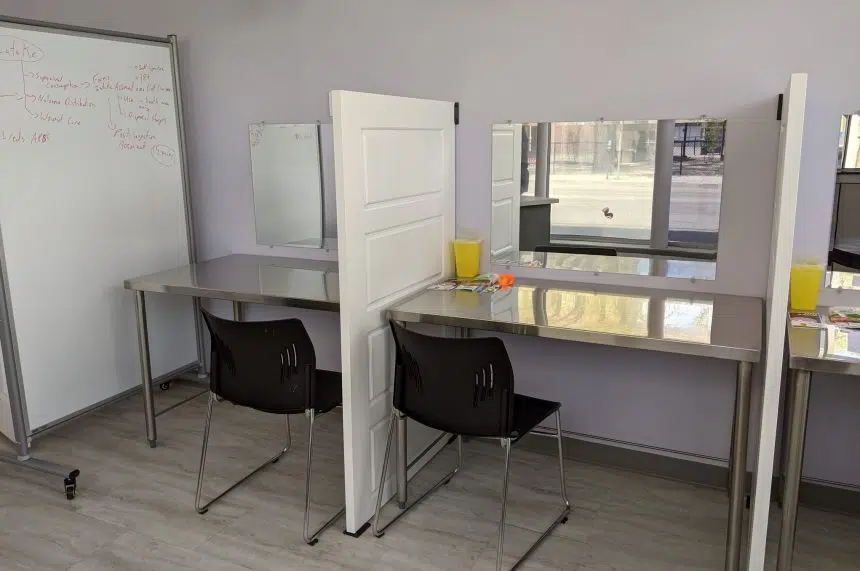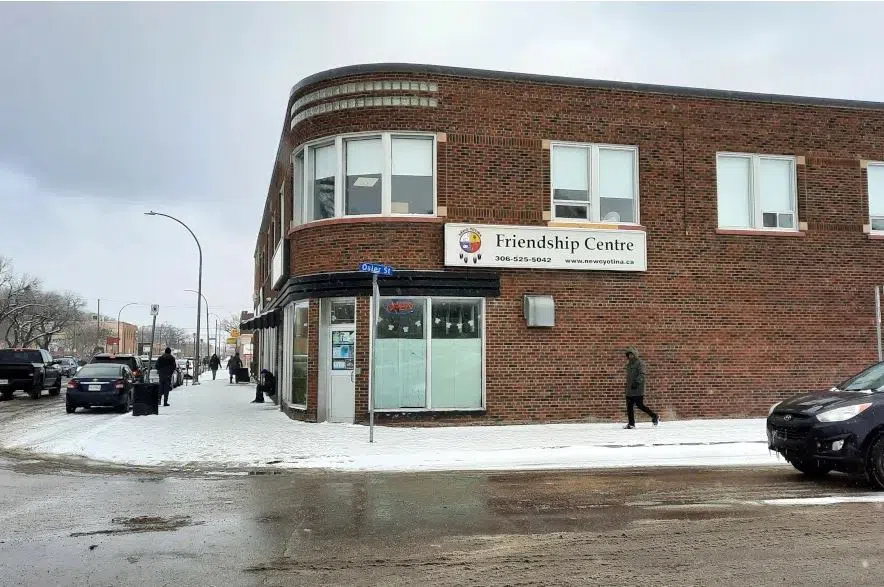It’s a space hoping to lower the amount of overdose deaths in Regina.
Wâhkôhtowin Harm Reduction is located within the Nēwo-Yōtina Friendship Centre on 11th Avenue.
It was previously operating as an urgent needs overdose prevention site. Now it is operating and being recognized as a safe consumption site under Health Canada.
Emilé Gariepy, harm reduction manager and a primary care paramedic for the centre said the organization has been trying to get the status changed for some time.
“There’s no changes to our services. They’re still the exact same,” he explained. “We’re still open seven days a week, from 9 a.m. to 4 p.m.”
Now that it’s recognized as a safe consumption site under Health Canada, the space is more permanent, according to Gariepy.

The Nēwo Yōtina Friendship Centre is the second supervised consumption site in Saskatchewan and the first of its kind in Regina. May 26, 2021 (980 CJME file photo)
But while it’s business as usual for the centre, Gariepy said he wants the public to take the time to understand what a consumption site is and what it offers. He said the people who use drugs at the site were going to use them anyway and emphasized that the centre does not provide people with drugs.
When people use drugs at the friendship centre, a paramedic is there to help if they suffer a medical emergency.
“The paramedics make sure that they are using safely and in a safe manner, and they are also watched in case of overdoses,” he said.
Gariepy said the quick response to emergencies is critical, as someone having an overdose might stop breathing and with every passing minute, the potential for medical complications grows.
At the friendship centre, when an overdose happens the person is immediately given naloxone – a drug that can reverse the effects of an opiate overdose – and oxygen in an effort to get them breathing again, hopefully preventing brain damage.
Gariepy said this not only saves lives but also saves money.
“The amount of money it costs to stay in an ICU bed is quite expensive,” he explained. Additionally, they usually do not have to go to the hospital from the centre.
According to the Canadian Institute for Health Information, the cost of a standard hospital stay in Regina was $8,013 from 2022 to 2023.
“Every overdose that happens, you have multiple emergency vehicles showing up, ambulances, police and fire trucks, because they’re very high needs medical emergency. So when (an overdose) is happening here, we’re not having them go through all that, so that’s saving hospital money and taxpayers’ money.”
The centre also provides clean needles and supplies, in an effort to slow down the spread of HIV and Hepatitis C. Saskatchewan has the highest HIV rate in Canada.
Read more:
- Regina’s supervised consumption site set to operate beyond urgent cases
- ‘We need to help them find a path’: Gov’t to move to recovery-based addictions system
- Drug users ‘turning to needles’ after Saskatchewan cuts pipe program
Gariepy compared the consumption site to a bar where alcohol is served. At bars, a sober bartender serves you a drink and watches for your safety and he said the consumption site is similar.
But, he added, consumption sites are often victims of harmful stigmatization.
“I’d like to see more people actually putting in some time and educating themselves on what harm reduction is, and why it’s useful,” he said.
“There’s never been a death in the safe consumption (sites) across Canada.”
According to Statistics Canada, between March 2020 and August of 2024, there have been 43,566 overdoses at safe consumption sites across Canada, but none have so far been fatal.
Drug deaths down across Saskatchewan
The Saskatchewan Coroners Service recently released statistics on confirmed and suspected drug toxicity deaths for 2024. There were 346 confirmed and suspected drug deaths in Saskatchewan last year, down from the 484 recorded in 2023.
A majority of those deaths were recorded in Regina (77) and Saskatoon (68).
Gariepy said he hopes to see that number continue to fall.
“I think it’s a great thing,” he said. “I’d like to hopefully see it steadily keep going down every year. I’d like to think that we played a good part in that.”
Gariepy said he hopes more people understand the importance of harm reduction in the future, adding that he’d like to see both federal and provincial funding channelled towards harm reduction and a focus on mental health treatment.
The Government of Saskatchewan, meanwhile, shifted its focus last year to a “recovery-based” approach to addictions, which prioritizes getting treatment for drug users to help them break their addictions.
“No illicit drugs are safe, and there is no safe use of illicit drugs,” the Ministry of Health said in a statement.
“Our focus is on getting people the treatment and rehabilitation that they need to overcome addictions and live healthy, safe lives in recovery.”











